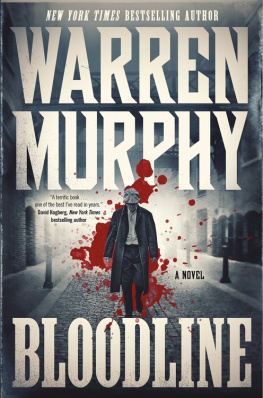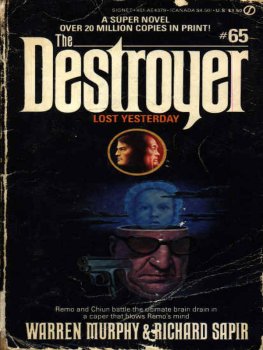***********************************************
* Title : #017 : LAST WAR DANCE *
* Series : The Destroyer *
* Author(s) : Warren Murphy and Richard Sapir *
* Location : Gillian Archives *
***********************************************
CHAPTER ONE
Twenty-five feet down they began hitting the bodies. The big scoop that had followed the workers down into the Montana earth, devouring the loosenings of dynamite and pick, spilled out bones from its soil-dripping jaws.
Cracked skulls there were, large and small and some so tiny they looked as if they had come from the necks of monkeys. Limb bones, some cracked, some whole, some smashed into sharp white fragments. You could walk in the crunch of bones that dry summer afternoon in 1961.
The workmen asked if they should stop.
"No," said the government supervisor from Washington. "I don't think so. I'll check, though. Jeez. All in one bunch, huh?"
"So far," said the foreman. "In the last scoop."
"Jeez," said the supervisor again and disappeared into his gray trailer, where everyone knew he had a telephone without a dial that he didn't talk about and a safe hidden under his bunk that he didn't talk about and an assistant who carried a .45 automatic and didn't talk to anyone.
The foreman turned to the workers, who had been standing around waiting for a decision. "Whaddya want from me, already?" he asked in accent that was strange for the prairie country. "You know what kind of a contract dis is. Who else digs hundred-foot holes in da middle of prairies? Don't waste your time waiting for the supervisor. Don't even wait for him. He's going to say, 'Go back to work.' Guaranteed. When he come out of dat trailer, he's going to say, 'Go the other seventy-five feet.'"
A crane-operator climbed down from the cab of his crane and picked up what looked like a fragment of a whitish bowl.
"Who could do such a thing? Who'd wanna do such a thing?" he asked, looking at the remnant of the small head, which fit into the palm of one hand, and at the cracked hole in the back of it. Then he started to cry. He placed it gently on a small rise and refused to dig farther.
"You gotta," said the foreman. "It's part of da contract. No stoppages are allowed on dese kind of contracts. They'll pull your union card."
"You can take your contract and wipe your nose wit' it! Dat crane don't go no farther," he wailed in heavy Brooklynese.
Other machines stopped, and picks stopped, and there was silence in the prairie.
The government supervisor came running out of the gray trailer. "It's all right. It's all right. It's all right," he shouted. "Go ahead. Don't worry about the bones. They're hundreds of years old."
"You hear dat?" yelled the foreman into the hole. "He says the bones are hundreds and hundreds of years old."
"Then how come dere's a piece of lead in dis skull and a small hole in it? How come, huh?" yelled back one of the workmen. "And here's a woman's beads or something. How come da bullet?"
"Maybe she fell on a piece of lead. How should I know?"
"It ain't hundreds of years."
"So if it's yesterday, already, what do you care?" yelled the foreman.
"Because I care," said the worker.
"You'll never work on one of these again," the, government supervisor said angrily. "But all right. If you men have to be shown, we'll find someone who will explain to you that we're not just ignoring a mass murder."
Late that afternoon a U.S. Air Force helicopter settled down on the site, and a white-haired man with a magnificent tan got out. He spoke with the soft quiet of authority and the simplicity of real expertise. There had not been one mass murder there, he said, but two. They had happened thousands of years apart.
The later one occurred in 1873one of the last Indian battles, if it could be called a battle. A U. S. Cavalry troop searching for a Sioux raiding party came across the peaceful Indian village of Wounded Elk and massacred the men, women, and children. Hence the bullets in some of the skulls.
This happened at the time when the government was first becoming ashamed of its treatment of the Indians. So the massacre was kept quiet, and the punishment for the cavalry troop was to dig a hole fifty feet deep and bury the incriminating evidence.
But at twenty-five feet they discovered older bones, and the captain ordered them to dig no farther but to bury the victims at that level.
"Where'd da older bones come from?" demanded the crane-operator.
"Well, do you see that child's skull over there on that little mound?" asked the white-haired man, pointing to the head that had brought the recent tears. "It was killed in Indian fashion. They would grab a child by its feet and bash its head against a rock."
The crane-operator looked disgusted. "Dat's awful," he said. "When'd dat happen?"
"The best estimate is between ten and fifteen thousand years ago. Those are rough parameters, but in this prairie, twenty-five feet down equals roughly fifteen thousand years. Indians didn't bury their massacres beneath the ground you see. They left them on ground level." His voice carried that little dancing joy of amusement, but there was no other amusement at the deep prairie hole.
Eyebrows were furrowed, and the eyes of these men with rough, weathered faces showed deep pity. Fifteen thousand, a hundred thousand years meant little when they thought about someone swinging a baby by its feet to bash its head against a rock.
"In da later massacree," began a man, leaning thick arms on the handle of a pick, "the one with da calvary how come youse guys know about it, when da government wanted to keep it like, secret, you know. How come?"
"Yeah, how come?" asked the crane-operator.
The white-haired man smiled as if a clear fact were always a pleasure, even when it concerned the murder of a baby. "It is in the archives of the old Department of the Army, which is now the Department of Defense. We knew where this site was, but we didn't think you'd hit it exactly. The odds against hitting it exactly were millions to one, considering the original location was fixed by star and by very distant landmark. This is a big, big prairie."
"Yeah. You can say dat again. I ain't sure where da hell we are," said the crane-operator.
"You're not supposed to," said the foreman. "Whaddya think, dey got us city guys on dis job because dey like Brooklyn or something? A shit-kicker might know just where he is. C'mon. Let's go. You got your answer. Back to woik."
The crane-operator returned to his cab, and other machines started. The helicopter left the prairie, where there was again the hammering noise of civilization.
The workmen continued for two weeks, digging to exact specifications, and then went on to another site, hundreds of miles away, where they dug another hole, whose only purpose was to confuse them about the location of the first.
The supervisor from Washington and his quiet assistant with the gun stayed on at the first hole. After the excavators came the men who built the metal structure for the concrete. And after the concrete was poured, a perfectly round hole hardened exactly one hundred eleven feet deep in the Montana prairie. The supervisor and the man with the gun stayed on.
After the concrete came the skilled technicians who completed the wiring for the giant underground silo. And after them, in three stages, on Air Force flatbed trucks, came the missile. Putting it in place was like constructing an eleven-story building underground with a jeweler's loupe. This too was completed, and the supervisor and the man with the gun watched the technicians go.
It was winter when the large box came in the tractor-trailer. The driver was the white-haired man who had answered the diggers' questions. His tan was still magnificent.
Next page



